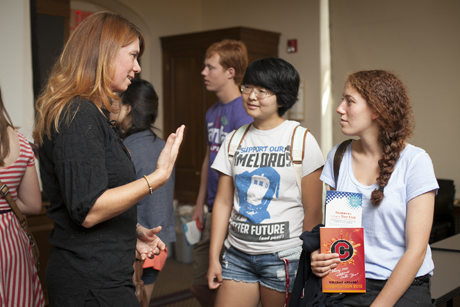Faculty-in-residence promote engaged learning
By Nancy Doolittle

The North Campus Faculty-in-Residence program not only makes faculty members available to first-year students outside the classroom or office hours, it also encourages students’ intellectual engagement in their daily lives, says Laura Brown, senior vice provost for undergraduate education.
The three faculty-in-residence who joined North Campus this fall – Sahara Byrne, Christopher Umbach and Maria Fernandez – are former faculty fellows familiar with the living/learning concept. Each offers programs designed to intellectually inspire the students in their residence halls. North Campus faculty-in-residence serve three-year terms, renewable for another three years.
“The North Campus Faculty-in-Residence program is part of a broader university effort to promote engaged learning, research and teaching,” Brown says. Its aims have been integrated with those of West Campus and its programming increased to help students find their academic niche, she says.
Byrne, associate professor in the Department of Communication, lives at Mews Hall with her husband, Christopher, and their two daughters. She plans to host weekly Thursday night “New Like You” dinners with new faculty members, Mews students and faculty fellows. She also is offering monthly panel discussions about careers, a weekly “Learning Where You Live” course on the TV drama “Sleepy Hollow,” and periodic dinners with Keeton House residents, Mews’ unofficial sister house on West Campus.
“I hope to assist in any way I can with the intellectual transition from home to college and to open students’ minds to ideas and careers they hadn’t considered,” she says.
Beginning in October, Umbach, adjunct professor in materials science and engineering and a senior research associate for the Cornell Center for Materials Research, will live in an apartment in Dickson Hall with his wife, Julie, and cats Cleo and Tiger. He looks forward to bringing faculty, guest speakers and trustees to community dinners on Monday nights; evening dessert discussions with students and visiting faculty; movie nights; and “getting to know animals” gatherings that will feature their cats.
Umbach first became interested in the Faculty-in-Residence program when in 2009 he organized the Mat Sci Expo at the Carol Tatkon Center and “discovered a strong connection with students seeking their place in the intellectual community.” He says the “more time I spend with the first-years, the more I realize how remarkable they are. I hope we can in some way shepherd them on to the next stage of their accomplishment.”
After being a house fellow for three years at Flora Rose House on West Campus, Fernandez, associate professor of the history of art, has moved to Court Hall with her son. Her experiences with West Campus upperclassmen will help her prepare first-year students in Court for their possible transition to West Campus next year.
“I hope to encourage students to take advantage of such cultural events as concerts and art exhibitions, to get to know faculty in various departments and to enjoy movies of diverse qualities,” she says. With her residents, Fernandez will also explore changes in technology and accepted norms in visual representations of science fiction. Fernandez also will offer study breaks and trips to such attractions as the Ithaca farmer’s market, a local farm and a walk at Sapsucker Woods.
“Cornell can take advantage of the expertise of our faculty-in-residence, bringing together a number of programs in an integrative and collaborative way – Learning Where You Live courses, undergraduate research and interdisciplinary activities, for instance – to ensure our first-year students are engaged in their education,” Brown says.
Media Contact
Get Cornell news delivered right to your inbox.
Subscribe